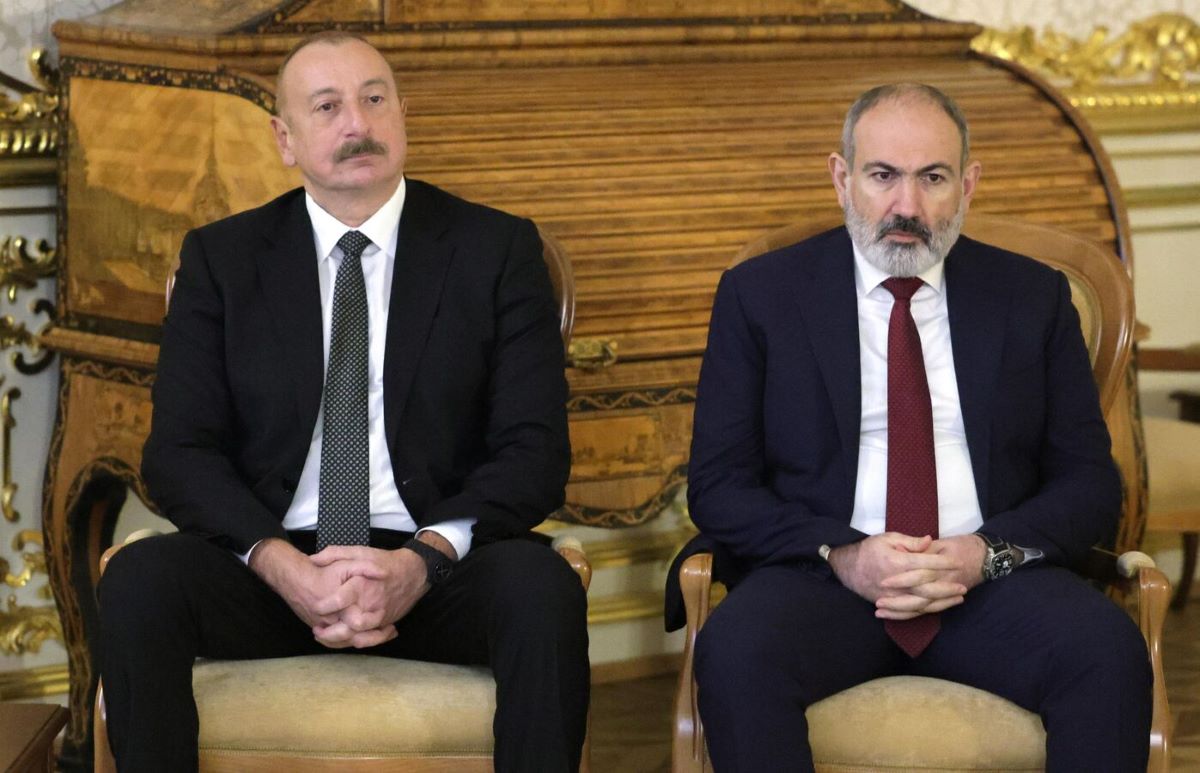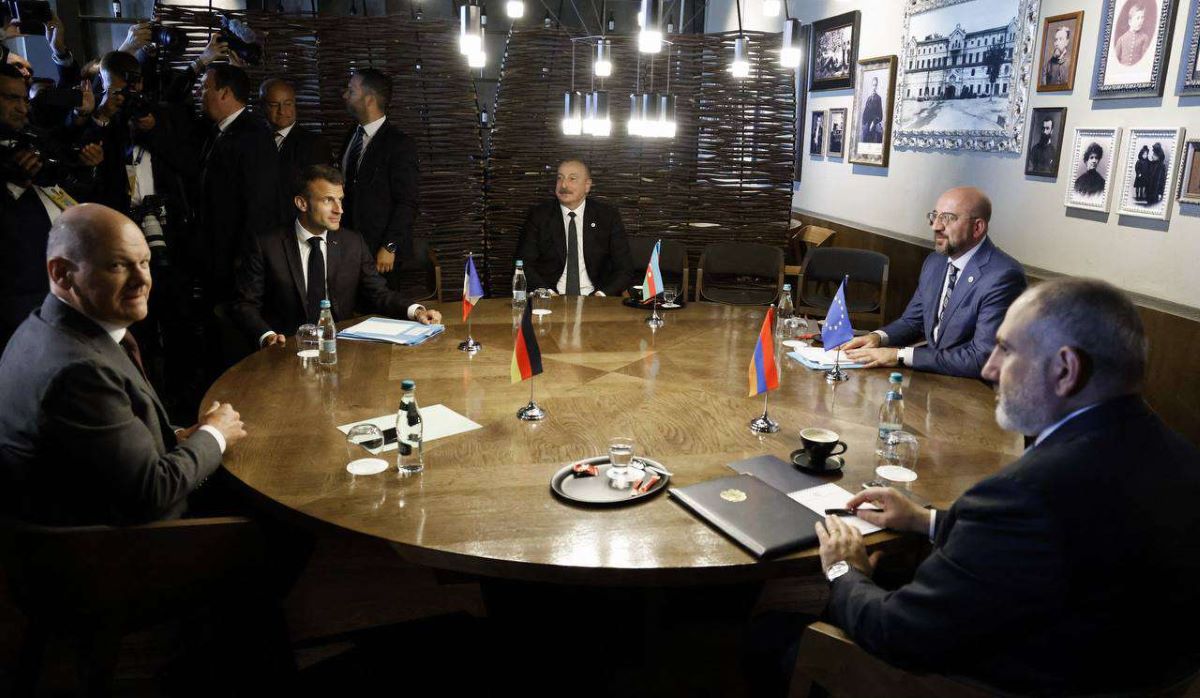Opinion: “If Baku doesn’t return to Western format, it may lose a lot”
Pashinyan-Aliyev-Scholz meeting
“Baku will resume negotiations with Armenia on Western platforms, as its destructive attitude towards the West risks jeopardizing its achieved gains.” This viewpoint is expressed by political scientist Robert Ghevondyan.
By losses, he specifically refers to the Karabakh issue, which holds significant importance for Azerbaijan. The political scientist contends that “this issue remains open for the West.”
The expert explains President Ilham Aliyev’s decision to engage in talks with Armenian Prime Minister Nikol Pashinyan during the Munich conference, following a prolonged boycott of Western platforms, by asserting that Azerbaijan has evaluated all potential threats.
The official information regarding the outcomes of the Munich meeting, facilitated by German Chancellor Olaf Scholz, as well as commentary from an Armenian political scientist.
“It was agreed to continue the work on the peace treaty”
Information regarding the outcomes of the trilateral meeting involving the prime minister of Armenia, the chancellor of Germany, and the president of Azerbaijan during the Munich conference is very concise.
“The normalization process of Armenia-Azerbaijan relations and steps aimed at ensuring peace and stability in the region were discussed. It was agreed to continue the work on the peace treaty,” it is said in a statement by the Armenian government.
Following the meeting, Olaf Scholz posted on his X microblog that Germany and Europe are prepared to support peace negotiations between Armenia and Azerbaijan to the extent of their capabilities. He expressed satisfaction that “the parties have agreed to resolve open issues without resorting to new violence.”
The German government also stated that during the meeting, the chancellor urged the parties to finalize negotiations on a peace treaty as soon as possible.
Subsequently, the prime minister of Armenia addressed the specifics of the trilateral negotiations during a meeting with representatives of the Armenian community in Munich. According to Nikol Pashinyan, a crucial aspect discussed at the negotiation table was whether the parties would reaffirm the previously reached agreements in Prague and Brussels regarding mutual recognition of the territorial integrity of both countries.
“The key takeaway is that the parties remain committed to these agreements. Their adherence will aid in alleviating border tensions,” he remarked.
Pashinyan also mentioned that during the trilateral meeting, an agreement was reached to schedule meetings of foreign ministers in the near future, followed by commissions on border delimitation. During the foreign ministers’ meeting, the text of the peace agreement will be deliberated and finalized.
Azerbaijani media outlets reported that following the trilateral meeting, Pashinyan and Aliyev had a brief private conversation. However, Armenian sources have not provided such information.
Comment
According to political scientist Robert Ghevondyan, if the president of Azerbaijan continues to deteriorate relations with the West and aligns completely with the “Russian wing,” he risks undermining all recent achievements.
He emphasizes that Aliyev is pursuing a shrewd policy; thus, despite pressure from Moscow, he strives to maintain constructive relations with the West. Otherwise, the expert warns, the Karabakh issue could resurface for Azerbaijan:
“The Artsakh topic could resurface unexpectedly. There are human rights and ethnic cleansing concerns. Consequently, issues such as the right to self-determination, based on the implementation of fundamental human rights, could arise at any moment. This was highlighted by German Chancellor Scholz last year, by the way.”
Ghevondyan has the impression that the West is attempting to replace France with Germany in mediation efforts. He believes Germany entered the game because Azerbaijan views France’s involvement as problematic.
According to the expert, Germany is assuming the role of a “neutral mediator” in Armenian-Azerbaijani negotiations. However, this doesn’t imply a shift in Western approaches.
He is convinced that the meeting between the leaders of Armenia and Azerbaijan in Munich was prearranged. He doesn’t see it as a coincidence that it occurred after the presidential elections in Azerbaijan. He points out that both in Armenia and the West, certain circles were hopeful for a potential return of Baku to cooperation after the elections:
“This marks the first step toward meeting these expectations. Whether there will be further developments remains to be seen. It all hinges on how Azerbaijan assesses its capabilities.”
According to the political scientist, if Baku perceives that it can gain more advantages through destructive actions, it will not proceed with these negotiations.
He suggests that there may have been different evaluations at this juncture, leading to Aliyev’s agreement to meet with Pashinyan. The analyst asserts that the West anticipates Azerbaijan to reevaluate the situation, and negotiations for a peace agreement will persist on Western platforms. Ghevondyan himself deems this scenario likely:
“The West has consistently exerted pressure on Aliyev in this regard. Numerous economic and political facts and events attest to this. What changed at that moment was that Aliyev acquired the significant legitimacy he sought. He secured ‘painted’ 92 percent of the votes.”
Ghevondyan finds it improbable that “Aliyev will persist in positioning Azerbaijan as a state advancing Russian interests in the Russia-West conflict and resisting Western pressure.”
Regarding Yerevan’s stance, he urges authorities to maintain their defense of key principles, particularly concerning the so-called “Zangezur corridor.” He firmly believes that no other state should have control over roads within Armenia’s sovereign territory.
“Simultaneously, it is imperative to continue reforming the army, developing a strategy to enhance its capabilities ‘on the ground,’ thereby ensuring Armenia has a contingency plan, should unfavorable circumstances arise. Because it’s plausible that, alongside negotiations, there may be provocations and minor-scale military escalations,” remarked Robert Ghevondyan.
Follow us – Twitter | Facebook | Instagram
Pashinyan-Aliyev-Scholz meeting




















